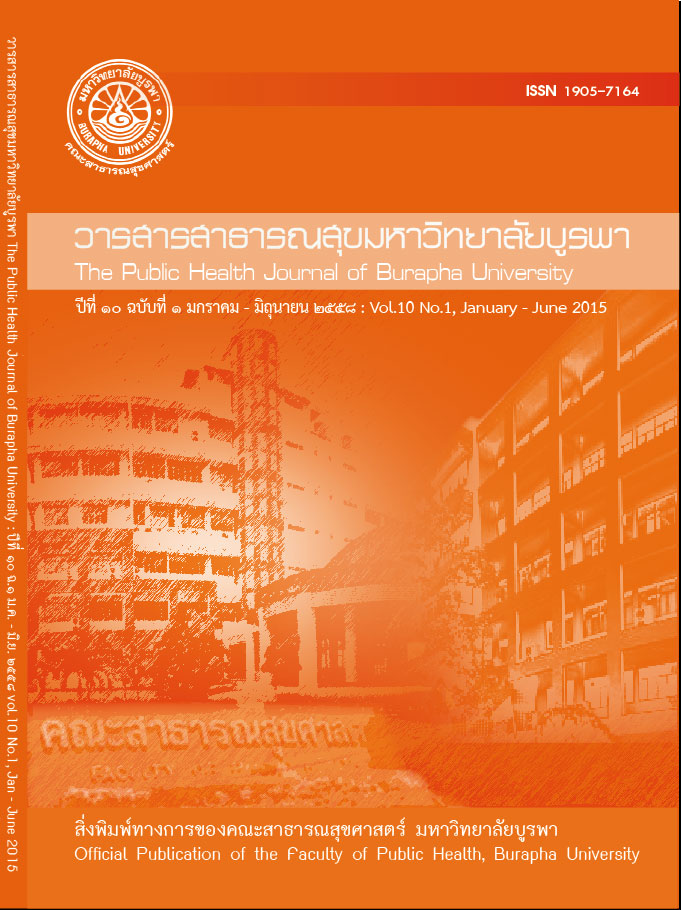Analysis of Factors Affecting Participation Levels of Urban and Rural Areas in Environmental Management Based on Philosophy of Sufficiency Economy
Main Article Content
บทคัดย่อ
การวิเคราะห์ปัจจัยที่มีผลต่อการมีส่วนร่วมของชุมชนเมืองและชุมชนชนบท ในการจัดการสิ่งแวดล้อม โดยยึดหลักปรัชญาของเศรษฐกิจพอเพียง
สาขา ภู่จินดา, วิวัฒน์ แก้วดวงเล็ก
คณะบริหารการพัฒนาสิ่งแวดล้อม สถาบันบัณฑิตพัฒนบริหารศาสตร์ (นิด้า)
การศึกษาครั้งนี้มีวัตถุประสงค์หลัก คือ เพื่อศึกษาปัจจัยที่มีผลต่อการมีส่วนร่วมในการจัดการ สิ่งแวดล้อม โดยยึดหลักปรัชญาของเศรษฐกิจพอเพียง ซึ่งทำการเก็บข้อมูลของประชาชนที่อาศัย อยู่ในชุมชนเมืองและชุมชนชนบท รวมทั้งสิ้น 10 แห่ง ในแต่ละชุมชนได้มีการเก็บแบบสอบถามกับ กลุ่มตัวอย่างชุมชนละ 20 ตัวอย่าง ทำการสุ่มตัวอย่างแบบบังเอิญ รวมทั้งสิ้น 200 ตัวอย่าง จากนั้น ทำการทดสอบสมมติฐานเพื่อหาความสัมพันธ์ของตัวแปร ร่วมกับการวิเคราะห์การจำแนกกลุ่ม (Discriminant Analysis) ที่ระดับนัยสำคัญ 0.05
ผลการศึกษาพบว่า กลุ่มตัวอย่างมีความรู้เกี่ยวกับหลักปรัชญาของเศรษฐกิจพอเพียงมากกว่า ค่าเฉลี่ย มีการรับรู้ข้อมูลข่าวสารเกี่ยวกับหลักปรัชญาของเศรษฐกิจพอเพียงจากผู้ใหญ่บ้าน และ โทรทัศน์มากที่สุด แต่กลุ่มตัวอย่างส่วนใหญ่มักมีส่วนร่วมในการจัดการสิ่งแวดล้อมในระดับน้อย ซึ่งจากการทดสอบสมมติฐาน พบว่า ความรู้เกี่ยวกับหลักปรัชญาของเศรษฐกิจพอเพียง ปัญหาทาง ด้านสิ่งแวดล้อม และการรับรู้ข้อมูลข่าวสารเกี่ยวกับหลักปรัชญาของเศรษฐกิจพอเพียง มีความสัมพันธ์ กับการมีส่วนร่วมในการจัดการสิ่งแวดล้อมโดยยึดหลักปรัชญาของเศรษฐกิจพอเพียง และปัจจัย ที่มีผลต่อการมีส่วนร่วมในระดับมาก ได้แก่ ปัญหาทางด้านทรัพยากรป่าไม้ปัญหามลพิษทางอากาศ และการรับรู้ข้อมูลข่าวสารผ่านแผ่นป้ายประชาสัมพันธ์ของชุมชน
The study aimed to investigate factors affecting participation levels in urban and rural areas about environmental management based on the Philosophy of Sufficiency Economy. Data collection was conducted using a questionnaire with two hundred people living in ten urban and rural areas. Data was then analyzed using the t-test, Pearson’s correlation, and Discriminant Analysis at a statistical level of 0.05.
The result showed that more than half of the people or samples living in urban and rural areas had knowledge and understanding about the Philosophy of Sufficiency Economy, and that this result was higher than the average value. People living in urban and rural areas received information about the philosophy from community leaders and television media respectively. However, most of people, in contrast, had engaged in participation at a lower level. The hypothesis tests showed that the knowledge in the philosophy, the environmental problems, and the informative perception of the philosophy were correlated with participation in environmental management at the statistical level of 0.05. Also, most of the factors affecting the participation level using discriminant analysis were deforestation, air pollution, and the people’s perception based on information from the community’s media.

